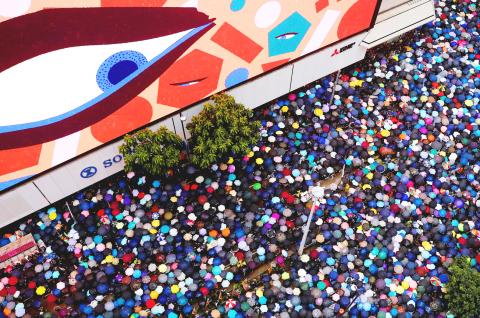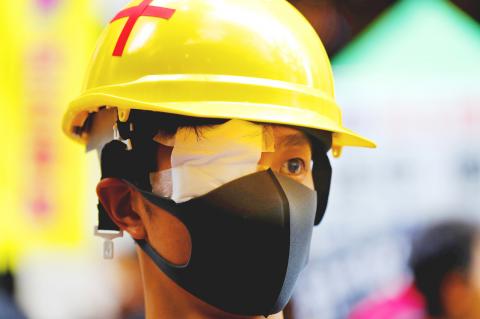Heavy rain fell on tens of thousands of umbrella-toting protesters yesterday as they marched from a packed park and filled a major road in Hong Kong, where mass pro-democracy demonstrations have become a regular weekend activity this summer.
Organizers said they hoped that the assembly would be peaceful, which would make for a rare calm weekend in a months-long movement that has been marked by violent clashes with police.
Law enforcement officers were keeping a low profile, with no riot police seen from the procession’s main routes.

Photo: Reuters
“We hope that there will not be any chaotic situations today [yesterday],” organizer Bonnie Leung (梁穎敏) said. “We hope we can show the world that Hong Kong people can be totally peaceful.”
Leung’s group, the Civil Human Rights Front, has organized three massive marches in Hong Kong since June.
However, the protest movement has been increasingly marked by clashes with police as demonstrators vent their frustrations over what they perceive to be the Hong Kong government’s blatant refusal to respond to their demands.

Photo: AP
“Peace is the No. 1 priority today,” said Kiki Ma, a 28-year-old accountant participating in the march. “We want to show that we aren’t like the government.”
While police had granted approval for the rally, they did not approve an accompanying march.
Demonstrators nevertheless fanned out and filled the streets, as there was not enough space at the designated assembly area.
Public transit trains did not stop at stations near the assembly because of overcrowding.
Harley Ho, a 20-year-old social work student who attended the rally, said that protesters were undeterred by the rain and would not rest until their demands were met.
“We will stand here, we will take action until they respond to us,” Ho said. “In the rain, our spirit becomes stronger.”
In Beijing, You Wenze (尤文澤), a spokesman for China’s ceremonial legislature, condemned statements from US lawmakers supportive of Hong Kong’s pro-democracy movement.
You called the lawmakers’ comments “a gross violation of the spirit of the rule of law, a blatant double standard and a gross interference in China’s internal affairs.”
He said that Hong Kong’s 7.5 million people and the Chinese population as a whole rejected the actions of a “very small group of violent protesters” as well as “any interference of foreign forces.”
You did not mention any specific lawmaker, but numerous US lawmakers, including US House of Representatives Speaker Nancy Pelosi, have affirmed the US’ commitment to human rights and urged the Hong Kong government to end the standoff.
The US Congress also has the power to pass legislation affecting Hong Kong’s relationship with the US in ways that could further erode the territory’s reputation for stability and rule of law.
That includes the recent reintroduction of the US’ Hong Kong Human Rights and Democracy Act, which would among its other provisions require the US secretary of state to issue an annual certification of Hong Kong’s autonomy to justify special treatment afforded to the territory.
More directly, US President Donald Trump could simply issue an executive order suspending Hong Kong’s special trading status with the US, a move that could have a devastating effect on the local economy at a time when Beijing and Washington are engaged in a trade dispute.
A former British colony, Hong Kong was returned to Beijing in 1997 under the framework of “one country, two systems,” which promised residents certain democratic rights not afforded to people in mainland China.
However, some Hong Kongers have accused the Chinese Communist Party-ruled central government of eroding their freedoms in recent years.
The protest movement’s demands include the resignation of Hong Kong Chief Executive Carrie Lam (林鄭月娥), democratic elections and an independent investigation into police use of force.
Members of China’s paramilitary People’s Armed Police force have been training for days across the border in Shenzhen, including yesterday morning, fueling speculation that they could be sent in to suppress the protests.
The Hong Kong police have said that they are capable of handling the protests.

INVESTIGATION: The case is the latest instance of a DPP figure being implicated in an espionage network accused of allegedly leaking information to Chinese intelligence Democratic Progressive Party (DPP) member Ho Jen-chieh (何仁傑) was detained and held incommunicado yesterday on suspicion of spying for China during his tenure as assistant to then-minister of foreign affairs Joseph Wu (吳釗燮). The Taipei District Prosecutors’ Office said Ho was implicated during its investigation into alleged spying activities by former Presidential Office consultant Wu Shang-yu (吳尚雨). Prosecutors said there is reason to believe Ho breached the National Security Act (國家安全法) by leaking classified Ministry of Foreign Affairs information to Chinese intelligence. Following interrogation, prosecutors petitioned the Taipei District Court to detain Ho, citing concerns over potential collusion or tampering of evidence. The

‘FORM OF PROTEST’: The German Institute Taipei said it was ‘shocked’ to see Nazi symbolism used in connection with political aims as it condemned the incident Sung Chien-liang (宋建樑), who led efforts to recall Democratic Progressive Party (DPP) Legislator Lee Kun-cheng (李坤城), was released on bail of NT$80,000 yesterday amid an outcry over a Nazi armband he wore to questioning the night before. Sung arrived at the New Taipei City District Prosecutors’ Office for questioning in a recall petition forgery case on Tuesday night wearing a red armband bearing a swastika, carrying a copy of Adolf Hitler’s Mein Kampf and giving a Nazi salute. Sung left the building at 1:15am without the armband and apparently covering the book with a coat. This is a serious international scandal and Chinese

Seventy percent of middle and elementary schools now conduct English classes entirely in English, the Ministry of Education said, as it encourages schools nationwide to adopt this practice Minister of Education (MOE) Cheng Ying-yao (鄭英耀) is scheduled to present a report on the government’s bilingual education policy to the Legislative Yuan’s Education and Culture Committee today. The report would outline strategies aimed at expanding access to education, reducing regional disparities and improving talent cultivation. Implementation of bilingual education policies has varied across local governments, occasionally drawing public criticism. For example, some schools have required teachers of non-English subjects to pass English proficiency

TRADE: The premier pledged safeguards on ‘Made in Taiwan’ labeling, anti-dumping measures and stricter export controls to strengthen its position in trade talks Products labeled “made in Taiwan” must be genuinely made in Taiwan, Premier Cho Jung-tai (卓榮泰) said yesterday, vowing to enforce strict safeguards against “origin laundering” and initiate anti-dumping investigations to prevent China dumping its products in Taiwan. Cho made the remarks in a discussion session with representatives from industries in Kaohsiung. In response to the US government’s recent announcement of “reciprocal” tariffs on its trading partners, President William Lai (賴清德) and Cho last week began a series of consultations with industry leaders nationwide to gather feedback and address concerns. Taiwanese and US officials held a videoconference on Friday evening to discuss the